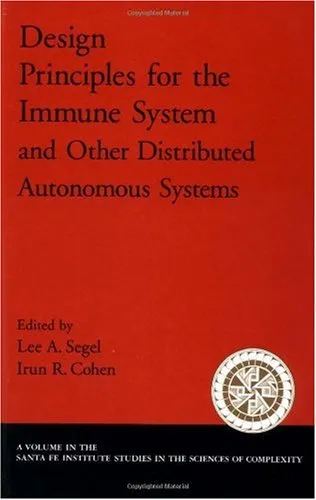Design Principles for the Immune System and Other Distributed Autonomous Systems (Santa Fe Institute Studies in the Sciences of Complexity Proceedings)
4.0
Reviews from our users

You Can Ask your questions from this book's AI after Login
Each download or ask from book AI costs 2 points. To earn more free points, please visit the Points Guide Page and complete some valuable actions.Related Refrences:
Introduction to "Design Principles for the Immune System and Other Distributed Autonomous Systems"
The book "Design Principles for the Immune System and Other Distributed Autonomous Systems" by Lee A. Segel and Irun R. Cohen represents a remarkable exploration of the intricate principles governing distributed systems in both biological and computational contexts. By drawing analogies between the immune system and other decentralized systems, this work bridges science, mathematics, and technology in a profound and intellectually stimulating way.
This book is part of the Santa Fe Institute Studies in the Sciences of Complexity series, which focuses on multidisciplinary approaches to understanding complex systems. Within its pages, the reader will uncover a wealth of insight into both natural and artificial distributed systems, with a special focus on the immune system—a highly sophisticated and self-regulating network capable of managing massive complexity with minimal centralized control.
As a foundational text for researchers and enthusiasts of systems theory and computational biology, the book discusses key aspects of decentralized systems, their design principles, and the parallels between biological entities and modern artificial intelligence systems. The immune system is not merely treated as a biological mechanism but as a paradigm of efficient distributed problem-solving.
Detailed Summary of the Book
At its core, the book provides an in-depth discussion of how distributed autonomous systems function and evolve. The biological immune system serves as a central case study for the theoretical framework presented. The authors meticulously analyze its decentralized architecture, exploring how it performs tasks such as pathogen detection, self-regulation, and memory storage without relying on centralized control.
The text delves into the following themes:
- The balance between self-organization and programmed functions in distributed systems.
- The immune system's strategies for maintaining stability amidst external perturbations.
- Design principles for artificial autonomous systems inspired by biological models.
- The trade-offs between redundancy, efficiency, and adaptability in decentralized environments.
In addition to theoretical explorations, the book considers practical implications for designing efficient and robust distributed systems in fields such as computational networks, robotics, and artificial intelligence. Each chapter builds on the previous one, leading to a comprehensive portrait of how complex systems operate at multiple levels of abstraction.
Key Takeaways
One of the book’s most compelling aspects is its ability to draw lessons from biology to inform the design of technological systems. Here are some of the key takeaways:
- Distributed systems thrive on decentralized control, where global behaviors emerge from local interactions.
- Redundancy is a critical feature of robust systems, ensuring survival and adaptability in the face of uncertain environments.
- Systems that can "learn" from their past interactions (e.g., immunological memory) provide a framework for adaptive problem-solving.
- Understanding the principles of the immune system can inspire the next generation of algorithms and machine learning models.
- Balancing competition and cooperation within a system fosters healthier, more sustainable dynamics.
Famous Quotes from the Book
The book contains many thought-provoking observations from Lee A. Segel and Irun R. Cohen. Here are a few noteworthy quotes:
"The immune system is less a mechanism and more a distributed, decision-making process that continuously adapts to a changing environment."
"Complexity thrives on simplicity—this paradox is central to both natural and artificial distributed systems."
"True intelligence emerges when diverse components cooperate and compete without a predefined blueprint."
Why This Book Matters
"Design Principles for the Immune System and Other Distributed Autonomous Systems" matters because it occupies both theoretical and practical niches in our understanding of complexity science. It is not just another book about distributed systems or immunology—it is a work that transcends disciplinary boundaries to offer solutions to some of our biggest design challenges.
In an era where artificial intelligence and autonomous robotics are rapidly evolving, understanding how to design systems that can operate efficiently without central oversight is more important than ever. The immune system, with its unparalleled ability to detect, adapt, and respond to changing environments, provides a roadmap that can fundamentally transform how we approach problems in technology, engineering, and life sciences.
Whether you are a biologist, a computer scientist, or someone interested in the philosophy of design, this book will inspire you to reconsider how we think about intelligence, adaptation, and resilience. It brings clarity to the intricate dance between order and disorder, offering insights that are as timeless as they are prescient.
Free Direct Download
Get Free Access to Download this and other Thousands of Books (Join Now)
For read this book you need PDF Reader Software like Foxit Reader
Accessing books through legal platforms and public libraries not only supports the rights of authors and publishers but also contributes to the sustainability of reading culture. Before downloading, please take a moment to consider these options.
Find this book on other platforms:
WorldCat helps you find books in libraries worldwide.
See ratings, reviews, and discussions on Goodreads.
Find and buy rare or used books on AbeBooks.



